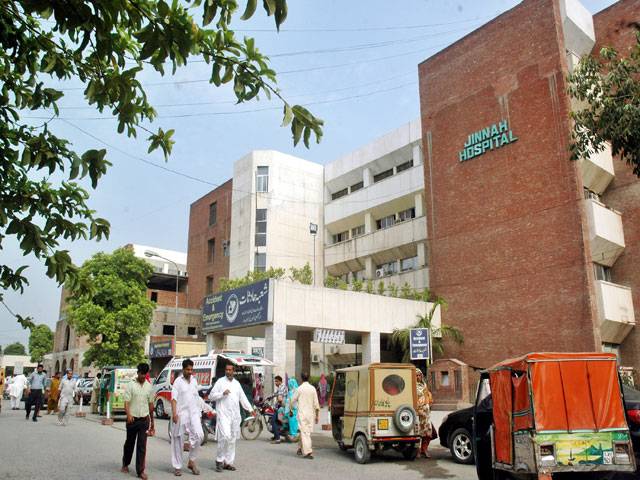LAHORE – Inefficient management, lack of interest on the part of consultants, shortage of doctors and allied staff, extraordinary workload of patients, and inadequate space in various departments has been affecting the overall service delivery at the Jinnah Hospital.
The public sector health care centre has been catering to the related needs of people living in southern parts of the City and adjoining districts. Besides the indoor patients, more than 2,000 people visit its emergency unit and up to 4,000 its outpatient department daily, making the hospital one of the busiest in Punjab.
Three years ago, the differences between the then Allama Iqbal Medical College (AIMC) principal and Jinnah Hospital medical superintendent caused its board of management to shift the emergency department under direct control of the former, setting a unique example of inefficiency that continues to this day at the leading hospital.
Health care providers have different views about taking control of the emergency unit from the Jinnah Hospital medical superintendent. Some believe that it has tremendously improved service delivery while others that direct supervision of the department by the principal has also affected control of the medical superintendent on other wings.
Though the majority of medicines are provided free at the emergency, poor patients are forced to bear the burden of purchasing the drugs unavailable at the hospital. Inadequate space for emergency and OPD, huge rush of patients and lack of interest on the part of consultants has been affecting service delivery at these important wings. OPDs patients are only given prescriptions and they have to purchase costly medicines from their own pockets.
The hospital has nothing to do with the management of its dialysis centre as a private party is running the important wing on a self-help basis. Lack of beds is causing the philanthropist to accommodate only registered and selected patients. Those needing emergency attention are given up to four-month date for the treatment.
Referring to the decision of BoM on the emergency department’s control, Jinnah Hospital MS Dr Muhammad Afzal Shaheen said that circumstances at that time could have led to this move but it would not cause bad impact on service delivery as long as intentions were fixed on facilitating the patients.
“Patients are getting hundred per cent free medicine at the emergency unit. If they (patients) are getting quality treatment and free medicine, then what is harm in placing control of any section under one person or the other”, he said, adding the MS office was providing every assistance and help for effective working.
“The hospital has already finalised rate contracts for the purchase of medicine in bulk at cheaper rates. This is making provision of free medicine possible,” he said, adding that the hospital was spending only Rs100,000 on local purchase of medicine.
However, he admitted that lack of space at emergency department was an issue that needed immediate attention.
“Yes, space for emergency unit is an issue as more than 2,000 people visit daily. I have already submitted proposal for allocation of admin block space to the emergency department. The admin block could be shifted to somewhere else for facilitating the patients visiting the emergency”, he said, adding that the architect chief had been asked to submit feasibility report for resolving the issue. He denied any shortage of doctors and allied staff at the hospital, saying all the departments were working properly. He, however, said that the hospital was seeking recruitment for making newly established units functional.
“Pulmonology and neurology departments have been established at the fourth floor of the hospital. An intensive care unit has also been established in the oncology ward. Doctors and allied staff will be recruited to make these wards functional,” said Dr Afzal, adding that functioning of these units would improve the status of the hospital.
Answering a question about difficulties to the dialysis patients, he said that a private party (philanthropist) was running the unit on a self-help basis and providing free treatment besides extra pay to the staff.
“Yes, lack of space is creating problems. At present, only 14 beds are available for dialysis patients. Now the hospital is giving another portion for increasing the bed capacity. It will resolve the issue”, he said, adding, the private party was effectively performing the duty of providing free dialysis facilities to patients.
Friday, April 19, 2024
Jinnah Hospital direly needs intensive care facilities

President calls for meaningful dialogue to end polarisation
April 19, 2024
KP minister briefed on issues about sales tax on services
April 19, 2024
64th anniversary of freedom fighter Mirzali Khan marked
April 19, 2024
893,000 students appear in SSC exams in KP
April 19, 2024
Hepatitis Challenge
April 18, 2024
IMF Predictions
April 18, 2024
Wheat War
April 18, 2024
Rail Revival
April 17, 2024
Addressing Climate Change
April 17, 2024
Justice denied
April 18, 2024
AI dilemmas unveiled
April 18, 2024
Tax tangle
April 18, 2024
Workforce inequality
April 17, 2024
New partnerships
April 17, 2024
ePaper - Nawaiwaqt
Advertisement
Nawaiwaqt Group | Copyright © 2024





